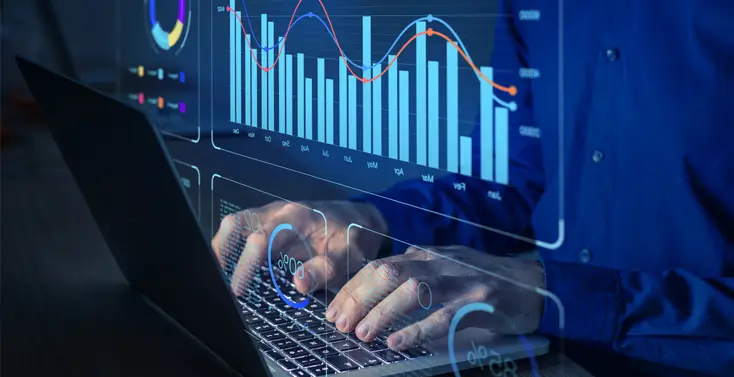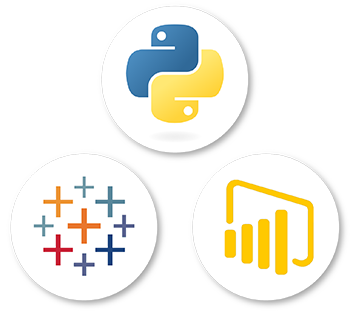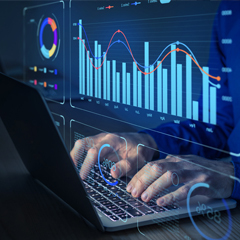Data Science Demystified: Core Principles

Unraveling the Mystery of Data Science: Grasping the Fundamental Concepts
Whether we realize it or not, we have all been integrating data science in our daily lives for years now. This notion makes it more important for us to understand what it is and how it affects us. To further understand the implications that data science has on business and industry, scientific discovery and beyond, we need to break data science down into its basic parts, that is, information and analysis. Consider that all decisions, whether consequential or minor, are based on available information and its analysis. If you looked at the weather report today and decided what to wear, you took for granted the data and information analysis that guided your decision.
Bellevue University is providing you with this guide on unraveling the mystery of data science and its fundamental concepts, so that you have the information you need to help you understand how data and analysis affects business, the tools and techniques employed in this exciting field, and to discover if data science is a field that piques your interest for further inquiry or study.
As today's world increasingly turns to data, data science has found its place at the heart of multiple sectors, from healthcare and finance to marketing and technology. If you are starting out in your tech career, a graduate, a career switcher, or going back to school, consider whether this lucrative and fast-moving field could be a good career fit for you.

Breaking Down Data Science
Data science is an interdisciplinary field that combines statistics, mathematics, programming and industry knowledge to draw valuable insights from data. It uses a range of techniques and programming tools to analyze and interpret data, ultimately enabling businesses to make informed decisions, predict outcomes and solve intricate problems.
In the current digital era, organizations are generating staggering amounts of data from various sources like customer interactions, clicks, social media and online transactions. By leveraging the power of data, businesses can learn more about consumers, gain a competitive advantage, enhance operational efficiency and foster innovation.
What is a data scientist?
Data scientists are the professionals who unlock the hidden value within the data. It is estimated that data scientists spend about 80% of their time finding and cleaning data. The data currently being produced is infinitely varied in its structure, presentation and scale. These experts combine technical skills, analytical thinking and industry knowledge in gathering, preparing, cleaning and automating dataset creation. The challenge is generating meaning and context when the data quality and type varies. Data scientists use advanced statistical models, machine learning algorithms and data visualization techniques to explore, analyze and derive actionable insights from complex datasets.
Data Science is a field that impacts every organization, which means the potential and opportunity for careers in data are endless. We are in an information age, where data is king and organizations that aren't leveraging and utilizing data will be left behind by their competition—making data analysis skills useful to everyone.
How is data science applied?
The applications of data science are widespread and extend across industries. In healthcare, for example, data science can be used to analyze patient records, predict patient admissions and disease outbreaks for better resource allocation and to optimize treatment plans. In finance, data science aids in fraud detection, risk assessment and portfolio management. Retailers use data science for discovering who their customers are, or, segmentation, forecasting demand for products and for personalized marketing to enhance the shopping experience. Moreover, data science is pivotal in industries such as manufacturing, transportation, energy and education.
As technology continues to advance, the amount of data available grows exponentially, and so the demand for data scientists rapidly increases. Organizations are acknowledging the value of data-driven decision-making, and data scientists are leading this revolution. By mastering the fundamental concepts of data science, you can set yourself on a rewarding career path and contribute to the growth and success of businesses and organizations.
Decoding Key Concepts in Data Science
Data science is a swiftly evolving field. To comprehend its core, it's crucial to delve into key concepts such as statistical analysis and hypothesis testing, machine learning algorithms and models, and data exploration and visualization techniques. Let's look at each of these.
Statistical analysis and hypothesis testing play a significant role in data science. These concepts enable data scientists to draw meaningful conclusions and make informed decisions based on data. Statistical analysis involves applying mathematical models and techniques to analyze data, while hypothesis testing aids in validating assumptions and drawing statistically significant conclusions.
Machine learning algorithms and models are at the heart of data science. These algorithms enable computers to learn from data, identify patterns and make predictions or decisions without explicit programming. Supervised learning, unsupervised learning and reinforcement learning are some of the common types of machine learning techniques used in data science.
Data exploration and visualization techniques are vital for understanding and gaining insights from data. By using various tools such as Python, Tableau and PowerBI, data scientists can reveal patterns, trends and relationships within the data. Visualization techniques like charts, graphs and interactive dashboards assist in presenting complex data in a more comprehensible and visually appealing way, so that the data tells a story.
Exploring Data Science Tools and Technologies
Data science employs various tools and technologies to draw meaningful insights from large and complex datasets. In this section, we will delve into some of the popular programming languages, data manipulation and analysis tools, as well as data visualization tools and libraries commonly used in data science.
When it comes to programming languages for data science, a few stand out as the current top choices. Python, with its extensive libraries such as NumPy, Pandas and Scikit-learn, provides a robust and versatile environment for data analysis and machine learning. R, another widely used language, offers a rich set of statistical and graphical techniques for data manipulation and visualization.
Data manipulation and analysis tools are crucial for cleaning, transforming and exploring datasets. Tools like SQL, used for querying and managing relational databases, are vital for data extraction and manipulation. Apache Spark, an open-source distributed computing system, enables processing of large-scale datasets in parallel, making it a popular choice for big data analytics.
Data visualization is vital for effectively communicating insights derived from data. Tools like Tableau, Microsoft Power BI and Python libraries like Matplotlib and Seaborn enable data scientists to create informative and visually appealing charts, graphs and interactive dashboards.

Next steps to Pursuing a Data Science Degree.
At Bellevue University, you can pursue a Bachelor's or Master's Degree in Data Science. Additionally, we offer a graduate certificate program in foundations of data science, consisting of courses from our Master's program. Get in touch, learn more and advance toward your online data science degree.















